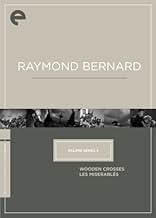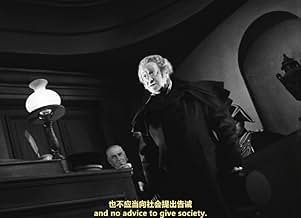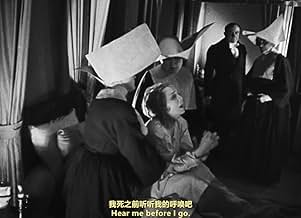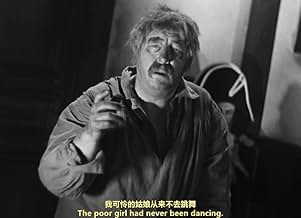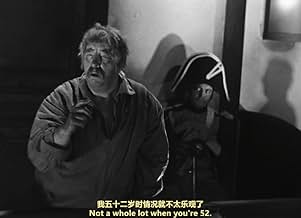As vidas de inúmeras pessoas, ao longo de 20 anos na França do século XIX, são conectadas pela história de um ex-presidiário chamado Jean Valjean, que foge de um inspetor de polícia obsessiv... Ler tudoAs vidas de inúmeras pessoas, ao longo de 20 anos na França do século XIX, são conectadas pela história de um ex-presidiário chamado Jean Valjean, que foge de um inspetor de polícia obsessivo, que o persegue por causa de um pequeno delito.As vidas de inúmeras pessoas, ao longo de 20 anos na França do século XIX, são conectadas pela história de um ex-presidiário chamado Jean Valjean, que foge de um inspetor de polícia obsessivo, que o persegue por causa de um pequeno delito.
- Direção
- Roteiristas
- Artistas
- Prêmios
- 1 vitória no total
- Félix Tholomiez
- (não creditado)
- Direção
- Roteiristas
- Elenco e equipe completos
- Produção, bilheteria e muito mais no IMDbPro
Avaliações em destaque
I've read the book, and the author Victor Hugo has a certain kind of great, rolling oceanic rhythm, where he starts to set up a scene, appears to wander around adding elements, then slowly brings people and events to a staggering, shuddering climax two- or three hundred pages later. And he manages it several times in the one book. It's a remarkable technique, and no other film version of Les Mis that I've seen manages to capture that feeling of majestic, gigantic tension and release the way this one does.
Now, I've only seen the three-hour version of the Depardieu/Dayan version, not the original six-hour, which I've never been able to track down in a version with English subtitles.
But I've seen just about every other version, and they all have a disjointed sense of pace and continuity that comes from jamming a huge novel into a Cuisinart and filming the pages that survive.
For overall achievement, this one takes the prize. Individual scenes have been done more effectively in other versions, but for capturing the feeling of actually having read the book, this movie is the best.
Other versions have gone deeper into the dirt and filth of Old Paris; much of this film was shot on backlot streets where even the dirt is clean, like a Sam Goldwyn picture. Director Raymond Bernard is also a little too fond of tilting the camera for dramatic effect, but you get used to it quickly, and some of the German Expressionist lighting is very effective.
This is the only version I've seen that shows the actual revolution Hugo describes with sympathy and patience, and the character of Marius gains terrifically from it. By contrast, the attitude towards revolution is nervous and dismissive in the 1935 March/Boleslawski version, as Hollywood was run by Republicans in those days, and Marius inevitably comes off like a twerp. Not here.
Also, the class distinctions among the characters are etched far more clearly than in other adaptations. Today's egalitarian impulses usually tend to bland out such niceties, but our contemporary demands for comfort with these interactions are ignored in this movie from 1933.
Harry Baur as Valjean is a dramatic giant, a stocky, massive bunch of nerve endings. He is from the same school as Emil Jannings, but fortunately never plumbs the depths of Jannings' abysmal, moist self-pity. It should also be noted that Baur is better here than in Abel Gance's film about Beethoven. Some of the actors surrounding him in Les Mis are a bit obvious, but OTOH this has the best Gavroche, period.
Charles Vanel is the only Inspector Javert you are likely to see who was not affected by Charles Laughton's remarkable portrayal of the character, as that was not to be filmed until two years afterward. Laughton's Javert was so intense that it unbalanced that picture, so that the film wound up being about his agony, not Jean Valjean's, which is wrong.
Charles Vanel's Javert appears to be offhand, methodical, restrained, banal; unlike Laughton, he has no speech about why he does what he does, and he gets very few closeups. There is next to no exploration of his interior life, if any, and his death is handled very differently from what we have come to expect.
Past the initial surprise, I think that is one point of the film, that Javert is not a flamboyant, obsessive madman. Vanel's Javert is not a twitchy rogue cop like Anthony Perkins or a reptilian boogeyman like John Malkovich; this film is not a Homeric one-on-one duel to the death like "The Fugitive." Here, Javert symbolizes a government of anonymous and casual brutality. He is a willing cog in a machine that metes out rigid punishment and has no mechanism for tempering justice with mercy. This approach will definitely provoke you to thought, which you can't say about most movies.
Anyway, forget the star-studded comic book adaptations that are the norm for this title, and curl up with a good book. This one is on two DVDs, takes around five hours to watch, and you'll never regret it.
Historical note: The creepy night scene where Cosette is sent, despite her fears, to fetch water a long way from home at the request of her heartless keepers, is a direct inspiration for Walt Disney's Snow White's panicky flight through the forest scene of three years later (1937).
May 2008 update: As most of you probably know, the whole film is now available on DVD from Criterion's Eclipse series in Region 1.
People interested in his Hugo adaptation (and they are numerous) should try and watch other works : a prolific director,he made forgettable movies (like everybody else) but "Cavalcade d'Amour " (1939) which tells three love stories in the same place but at different times;"Un Ami Viendra Ce Soir" a curious movie about the French Resistance - which might have inspired De Broca for his highly praised "Le Roi De Coeur ";"Le Jugement De Dieu" , a brilliant melodrama in the Middle Ages poorly remade later as a sketch of "Les Amours Célèbres with B. Bardot and A.Delon;a black comedy " Le Septième Ciel" ,all these movies worth seeking out;there's also a silent version of "Le Miracle Des Loups "(1924),later remade by André Hunebelle in the sixties.
Forgive me for this long introduction,but it's really a pity this director should be ignored even in his native country (among the many comments,how many come from French users?).
In the thirties ,it was a titanic task,actually an equivalent of Gance's "Napoleon" of the twenties;it's the only French thirties work which features three parts :at the time,in Paris, it was possible to see the whole in one day,for the theaters did not show the same film;later on,with the staggering exception of "Les Enfants Du Paris" ,the two-part movies (such as "Le Comte De Monte Cristo" and Le Chanois's much inferior own "Miserables" ) were released several months apart.
The male cast is close to perfect:Harry Baur is considered one of best French actors of all time ,the extraordinary lead of Duvivier's first talkie "David Golder "and was made to portray Valjean ;his restrained but highly intense acting works wonders in the scene with bishop Myriel and in all his scenes with Javert played by the always reliable Charles Vanel ,the only French actor enjoying 2 movies in the IMDb top 250- 'Le Salaire De La Peur " and "Les Diaboliques" - by the way!matching them all along the way is Charles Dullin - a great stage actor whose portraying of Molière's Harpagon has remained memorable-as Thénardier ,with his face ravaged by greed;Jean Servais the French audience mainly remembers for his later parts and often forgets there was a time when he was young,and he is a very good Marius.
On the other hand,the female parts are more uneven ;Florelle as Fantine is deeply moving ,the destitution's child who endures the unwed mother's fate;the great Marguerite Moreno shines as La Thénardier ,the actress was as convincing as a shrew as she was as a Grande dame;Pagnol's Orane Demazis is less talented as Eponine although she fortunately forgets her Provençal accent and has a good final scene (the part was intended for Arletty ) ;as for the forgotten actress who plays Cosette,she is totally bland (the part was intended for Danielle Darrieux)
Although Waterloo is not included -represented here by a painting and some Thénardier's lines- there are imposing scenes on the barricades ,and the death of Gavroche ("this little soul had flown away") is really moving,with a young actor with more screen presence than his sister;more intimate scenes such as these with bishop Myriel go straight to the heart ;and "the tempest in the skull" shows Bernard's virtuosity ,here in a league with Abel Gance .
Neither Le Chanois's nor Hossein's versions ,let alone American effort starring Liam Neeson can hold a candle to Bernard's Magnum Opus.
Você sabia?
- CuriosidadesRe-released in France in 1951.
- Erros de gravaçãoIn the second part, Les Thenardier, when Jean Servais overhears the pair plotting to rob Valjean, Raymond Bernard can be heard softly directing him to leave the room ("Vite!").
- Citações
Cosette: [as she and Valjean witness a convoy of convicts being taken to the penal colonies] But father... are they... still human?
Jean Valjean: Sometimes.
- ConexõesFeatured in Os Miseráveis (1995)
Principais escolhas
Detalhes
- Data de lançamento
- País de origem
- Central de atendimento oficial
- Idioma
- Também conhecido como
- Les Misérables
- Locações de filme
- Antibes, Alpes-Maritimes, França(Exterior)
- Empresa de produção
- Consulte mais créditos da empresa na IMDbPro
- Tempo de duração
- 4 h 39 min(279 min)
- Cor
- Proporção
- 1.37 : 1

